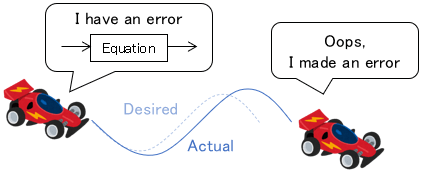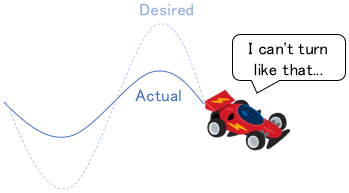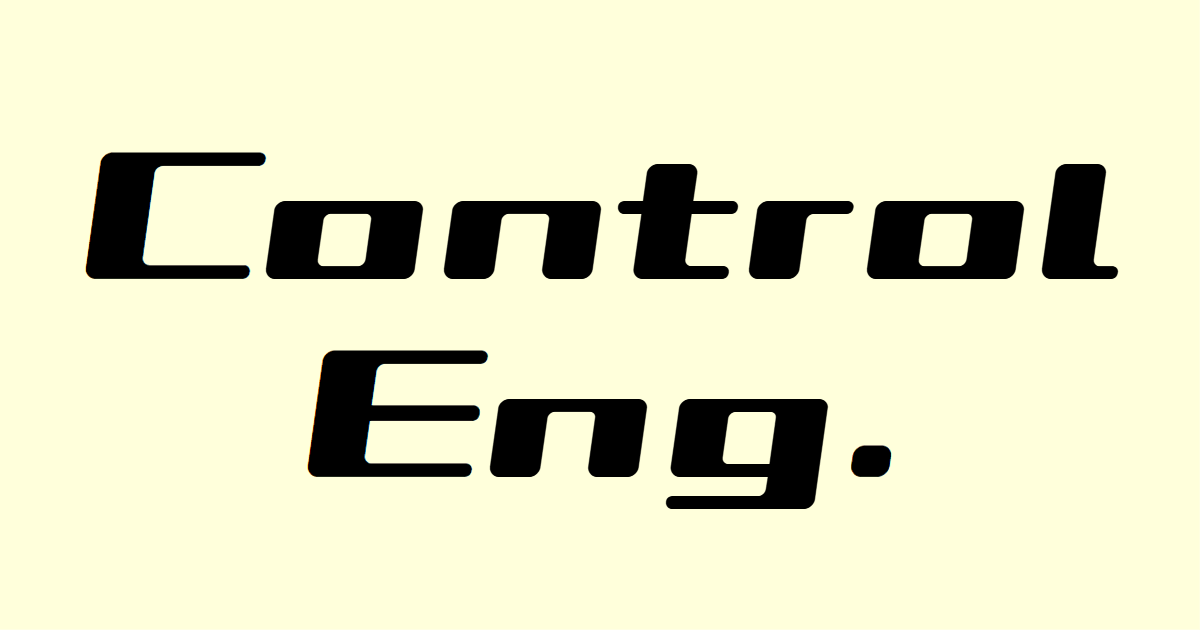This page provides an overview of control engineering, its fun parts, and its difficulties.
- Control engineering is the study of manipulating this world at will.
- Control engineering is fun!
- The difficulties of control engineering are errors, constraints, and theory.
What is Control Engineering?
In a nutshell, control engineering is the study of manipulating the world at will.
Let’s take a detailed look at it. The phenomena in this world have been studied in various fields of physics, and their laws are summarized in equations. The following are typical examples:
- Equations of motion in mechanics
- Navier-Stokes equations in fluid mechanics
- Maxwell’s equations in electromagnetism
Thanks to these equations, we can predict the future without actually experiencing it. In this sense, we can say that physics is the study to understand how the world works and to also predict the future.

It is very convenient to predict the future without experiencing it. However, since we can predict the future, we would want to make that future what we want it to be, wouldn’t we? Control engineering is the study of how to achieve this.

Fun Part of Control Engineering
Control engineering can be a delightful subject when you master it.
You will be pleased when the control you have designed works well. This is true even if the control target looks as simple as a radio-controlled toy car or a small clock.
No matter what the control target, when you succeed in controlling this world at will, you will feel like the master of this world!

And the more you learn about control engineering, the more you will be able to control even more things. Just imagine how exciting that will be!
Difficulties of Control Engineering
While gaining mastery of control engineering is fun, it is not so easy in practice to manipulate this world at will.

If you have an equation, why not just calculate it backward?
You may think so. The basic idea is correct, but when you try it, you will find it is not as straightforward as you might think.
The main reasons for this are errors, constraints, and theory. We can say control engineering is the study that fights against these factors. Let’s take a look at each of these factors in detail.
Errors
Physical equations almost always have errors. For example, let’s say we derived an equation for a radio-controlled car to control it. The equation could contain the following errors:
- Errors in physical parameters (e.g., mass, friction coefficient, etc.)
- Errors in the equation itself (e.g., air resistance not taken into account, etc.)
These errors will also cause errors in the calculation results of the equation. Therefore, simply calculating the equation backwards from your desired result will not work in most cases.

In control engineering, this problem caused by errors is primarily solved by feedback control. Feedback control is a technique that observes actual conditions and fine-tunes the control accordingly.
Note: For more details on feedback control, please see this page:
Constraints
Even if there is no error in the equations, there is another difficulty in control engineering called constraints.
Let us again consider the control of the radio-controlled car. As shown by the following points, there are various limits to the car’s performance.
- Handling performance (i.e. the angle at which the car can change direction)
- Motor performance (i.e. how fast the car can run)
- Battery performance (i.e. how long the car can run)
Of course, we need to control within these limits. These limits are the constraints.


Therefore, it is also the role of control engineering to control while satisfying constraints.
There are many ways to deal with constraints in control engineering. In practice, we have to select a method on a case-by-case basis.
Theory
Errors and constraints are tackled by control engineering, but we have to deal with theory directly. (Gah!)
Control engineering theories tend to be complex. Most advanced control theories require knowledge of college-level physics and mathematics. So some of you may have given up studying as soon as you opened your control engineering textbook.
But be rest assured that while some control methods are theoretically complex, there are also many simple and practical control methods (through which you can have the fun described above!).
This website provides intuitive explanations of various control theories so you can step up to the next level without any difficulty. I hope you will find it helpful.
- Control engineering is the study of manipulating this world at will.
- Control engineering is fun!
- The difficulties of control engineering are errors, constraints, and theory.



Comments